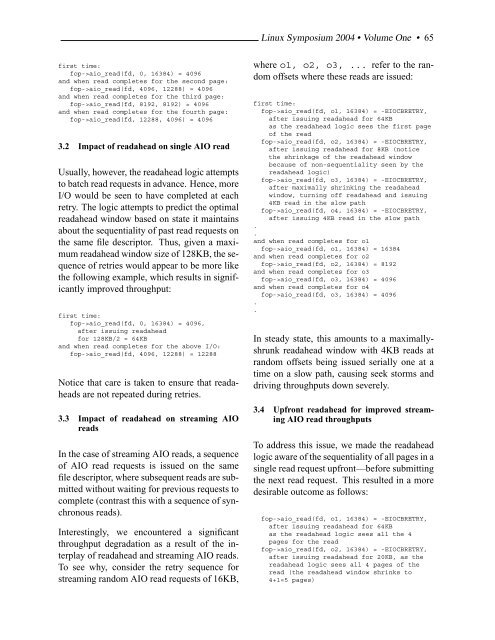You also want an ePaper? Increase the reach of your titles
YUMPU automatically turns print PDFs into web optimized ePapers that Google loves.
<strong>Linux</strong> Symposium 2004 • Volume <strong>One</strong> • 65<br />
first time:<br />
fop->aio_read(fd, 0, 16384) = 4096<br />
and when read completes for the second page:<br />
fop->aio_read(fd, 4096, 12288) = 4096<br />
and when read completes for the third page:<br />
fop->aio_read(fd, 8192, 8192) = 4096<br />
and when read completes for the fourth page:<br />
fop->aio_read(fd, 12288, 4096) = 4096<br />
3.2 Impact of readahead on single AIO read<br />
Usually, however, the readahead logic attempts<br />
to batch read requests in advance. Hence, more<br />
I/O would be seen to have completed at each<br />
retry. <strong>The</strong> logic attempts to predict the optimal<br />
readahead window based on state it maintains<br />
about the sequentiality of past read requests on<br />
the same file descriptor. Thus, given a maximum<br />
readahead window size of 128KB, the sequence<br />
of retries would appear to be more like<br />
the following example, which results in significantly<br />
improved throughput:<br />
first time:<br />
fop->aio_read(fd, 0, 16384) = 4096,<br />
after issuing readahead<br />
for 128KB/2 = 64KB<br />
and when read completes for the above I/O:<br />
fop->aio_read(fd, 4096, 12288) = 12288<br />
Notice that care is taken to ensure that readaheads<br />
are not repeated during retries.<br />
3.3 Impact of readahead on streaming AIO<br />
reads<br />
In the case of streaming AIO reads, a sequence<br />
of AIO read requests is issued on the same<br />
file descriptor, where subsequent reads are submitted<br />
without waiting for previous requests to<br />
complete (contrast this with a sequence of synchronous<br />
reads).<br />
Interestingly, we encountered a significant<br />
throughput degradation as a result of the interplay<br />
of readahead and streaming AIO reads.<br />
To see why, consider the retry sequence for<br />
streaming random AIO read requests of 16KB,<br />
where o1, o2, o3, ... refer to the random<br />
offsets where these reads are issued:<br />
first time:<br />
fop->aio_read(fd, o1, 16384) = -EIOCBRETRY,<br />
after issuing readahead for 64KB<br />
as the readahead logic sees the first page<br />
of the read<br />
fop->aio_read(fd, o2, 16384) = -EIOCBRETRY,<br />
after issuing readahead for 8KB (notice<br />
the shrinkage of the readahead window<br />
because of non-sequentiality seen by the<br />
readahead logic)<br />
fop->aio_read(fd, o3, 16384) = -EIOCBRETRY,<br />
after maximally shrinking the readahead<br />
window, turning off readahead and issuing<br />
4KB read in the slow path<br />
fop->aio_read(fd, o4, 16384) = -EIOCBRETRY,<br />
after issuing 4KB read in the slow path<br />
.<br />
.<br />
and when read completes for o1<br />
fop->aio_read(fd, o1, 16384) = 16384<br />
and when read completes for o2<br />
fop->aio_read(fd, o2, 16384) = 8192<br />
and when read completes for o3<br />
fop->aio_read(fd, o3, 16384) = 4096<br />
and when read completes for o4<br />
fop->aio_read(fd, o3, 16384) = 4096<br />
.<br />
.<br />
In steady state, this amounts to a maximallyshrunk<br />
readahead window with 4KB reads at<br />
random offsets being issued serially one at a<br />
time on a slow path, causing seek storms and<br />
driving throughputs down severely.<br />
3.4 Upfront readahead for improved streaming<br />
AIO read throughputs<br />
To address this issue, we made the readahead<br />
logic aware of the sequentiality of all pages in a<br />
single read request upfront—before submitting<br />
the next read request. This resulted in a more<br />
desirable outcome as follows:<br />
fop->aio_read(fd, o1, 16384) = -EIOCBRETRY,<br />
after issuing readahead for 64KB<br />
as the readahead logic sees all the 4<br />
pages for the read<br />
fop->aio_read(fd, o2, 16384) = -EIOCBRETRY,<br />
after issuing readahead for 20KB, as the<br />
readahead logic sees all 4 pages of the<br />
read (the readahead window shrinks to<br />
4+1=5 pages)

















